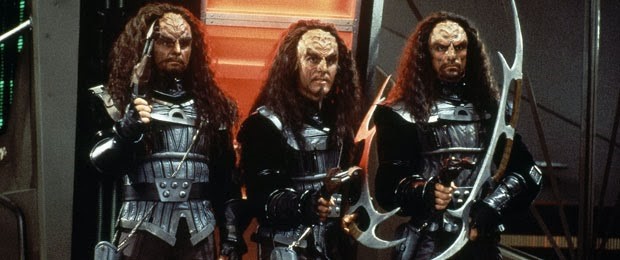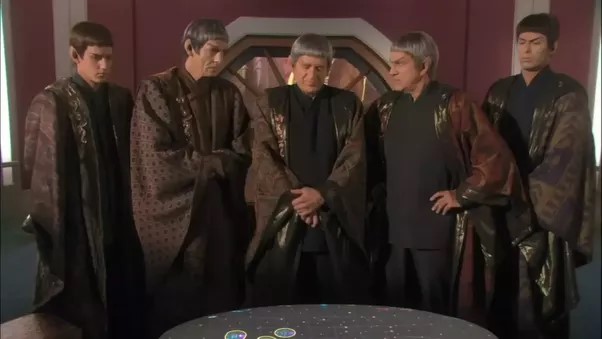What Aliens Teach Us About God, part 1
Science fiction has no shortage of intelligent alien races.1
Star Wars and Star Trek have hundreds between them and they only scratch the surface of the aliens that exist in worlds of fiction.
I’m not commenting here on whether aliens actually do exist (or can exist). But I think the very concept of alien intelligence can teach important truths about the nature of the God of the Bible. Because in some very important ways, the Creator of the universe does not think the way a human being thinks.
Let’s start off by talking about aliens and the various ways they are seen in science fiction. The first and only way I’ll tackle in this post is:
Science fiction often shows aliens as an exaggerated form of human being
Klingons of Star Trek are my favorite example of this.

Bumps on the forehead aside (and some other anatomical differences occasionally mentioned in Star Trek), what really distinguishes Klingons from humans is the fact that Klingons are a warrior race. Have there ever been any warrior nations in Earth history who were like Klingons in their attitudes towards war? Of course. PLENTY. From Saxon warriors to Maori to Samurai and many, many more, groups of humans have studied war and have created cultures in which either entire nations or at least a warrior sub-sect were as devoted to war as the fictional Klingons themselves.
What marks the Klingons as different from human cultures is it’s the entire species of people who are otherwise very similar to humans who are marked by a love of warfare. So Klingons in effect distill out of our race one aspect of human culture and put it on display on its own, marking Klingons as aliens who are essentially exaggerated humans.
Vulcans are also (mostly) exaggerated humans.

Die-hard Star Trek fans know there are even more physical differences between Vulcans and humans than Klingons and humans. Vulcans not only have the obvious pointed-ears, they have greater strength and speed than humans, (much) longer lives, unusual mental abilities, copper-based blood (in case you didn’t know, our blood is iron-based), and among other things, a powerful urge to mate that comes every seven years on a regular schedule.
But most people would say that the distinguishing characteristic of Vulcans is their reliance on logic, strict mental discipline, and suppression of emotion. Has that every existed among human cultures? Of course. Numerous times, though never quite to the degree of being Vulcan, and not quite as often as human cultures have embraced warfare.
Vulcan philosophy is most like the ancient Stoicism practiced in Greek and Roman culture, but has bits of transcendental meditation (or at least the claims of the practitioners of such meditation) and even pieces of Eastern religion, including especially aspects of Zen Buddhism. Again, like the Klingons, Vulcans allowed Star Trek writers to in effect purify and isolate one aspect of human behavior that already existed and make it characterize an entire species of extraterrestrials.
I would suggest the anatomical differences between Vulcans and humans (and Klingons and humans) were mostly for the purpose of making the Vulcans seem a bit more realistic as a non-human species. But the essential and vital part of what Star Trek shows a Vulcan to be is nothing more than a human sub-culture exaggerated into its own alien race.
Jabba the Hut as an archetypal gangster.

Jabba the Hutt shows how Star Wars, in contrast to Star Trek, often creates a single alien whose physical characteristics reveal his (or her) character. Jabba is monstrously huge and physically revolting. His size and grotesque form speak to his power and corruption, showing in his physical body that he’s both dangerous and disgusting.
Of course, there are no humans who look like Jabba, but a human can be every bit as revolting and equally as much a gangster kingpin. So I’d say Jabba simply exaggerates in physical form internal characteristics that certain human individuals have.
Jabba is a member of an alien race, but you see very little of his race in Star Wars. The characteristics he has are his and his alone in the movies—making it hard to imagine a member of his race as a police officer, nurse, or florist. His entire race is an exaggerated form of a certain set of human characteristics, those of a gangster.
Likewise, Chewbacca looks big, hairy, and powerful and his character shows the loyalty of a pet with the strength of sasquatch. What he looks like is who he is. Likewise, Yoda looks like a wizened master of esoteric wisdom and that’s who he is (Maz Kanata is very similar to him, though her wisdom is different). Jar Jar Binks both looks goofy and is goofy.
Star Wars does not always present alien races simply as exaggerated forms of humans—sometimes aliens are window dressing, seen in the background as scenery, with very little revealed about their character. But in general, Star Wars employs the method of showing in the physical form of an alien his or her essential characteristics—and those characteristics are something you’d find in a human being, only in exaggerated form.
What do aliens who are essentially exaggerated humans teach us about the God of the Bible?
I will explain more in later installments why, but I would say “not much.” It’s actually the gods and goddesses of Pagan religions who are in effect exaggerated human beings, whereas Jehovah is in many ways fundamentally different from us.
Though it’s in fact true that believers often understand God by looking at characteristics we have and thinking of him as having more of the same. We experience love and imagine God has more. We see justice and think of God as expressing more justice and a more perfect justice. And these observations are not entirely wrong—but they are not entirely correct either, as I will explain coming up.
What do you think about this topic? Would you agree that aliens in science fiction are often not all that alien, but are really exaggerated humans? Any thoughts on how this relates to an understanding of God?
- Note: Travis Perry is a science fiction author and editor and owner of Bear Publications. He’s also an Army Reserve officer with five wartime deployments, a speaker of multiple foreign languages, a major history, theology, and science buff, and a generally interesting guy. He is also thrilled to take Zac Totah’s place at Speculative Faith for the short-term. ↩










































Interesting thoughts, Travis. (And welcome on board!) I was thinking about the Ferengi and trying to decipher what culture might have the characteristics exhibited by them. We don’t have to go far to see their greed and entrepreneurship. Same with their attitude toward women (though the no-clothes aspect is clearly an exaggeration as is chewing the male’s food).
I do think the existence of huminoid traits that are similar to God is to be expected if we truly believe we are made in God’s image. Obviously I’m extending that to all races, though the idea that there are alien races opens the door to the consideration that only earthlings were made in His image. Is there any Christian science fiction that explores that idea?
Becky
the ferengi are really a caricature of American capitalism and commercialism combined with a gender segregation that evokes muslim cultures (at least from the perspective of western audiences.) They have a culture built around the “greed is good” idea which was particularly prevalent in western culture a few decades ago.
C S Lewis’ sci fi trilogy “out of the silent planet” shows a universe where everyone knows God except us – we are made in his image, but do not know him because of sin.
I’m not immediately aware of any SF where races differ from humans by not being made in god’s image – setting humans apart as above the others for that reason, but I think that setup would feel elitist. It might work, but I think it would have to include that being made in god’s image would come with a huge responsibility attached to represent him well.
Except the Klingons killed their gods. According to Worf, they were more trouble than they were worth.